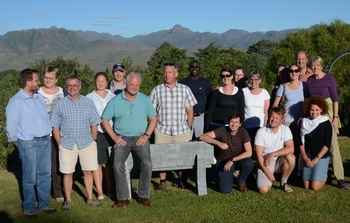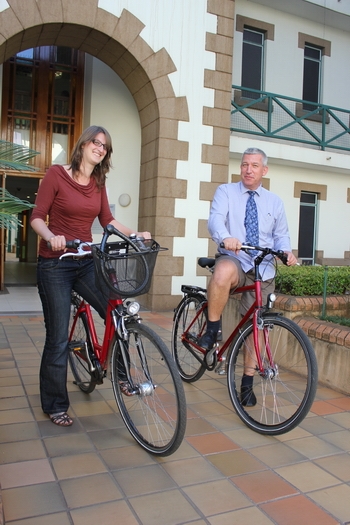Bernd Appelt, GIZ team leader and senior technical advisor, reflects back on five years at the helm of the Multi-sector HIV Prevention Programme in South Africa.
In early 2016 Bernd Appelt, a senior technical advisor and team leader with the Deutsche Gesellschaft für Internationale Zusammenarbeit (GIZ) GmbH, will leave behind the jacaranda-lined streets of Pretoria, his home for the past five years, to take up a new post in Phnom Penh. Healthy DEvelopments caught up with Appelt recently to hear what he has learned, professionally and personally, during his time as the principal advisor for Germany’s technical cooperation programme on HIV in South Africa.
Remarkable achievements in treatment, but prevention lags behind
Appelt’s tenure in South Africa has coincided with some seismic changes in the country’s HIV epidemic. Between mid-2011 and mid-2015 the number of people on antiretroviral treatment in the public sector doubled from roughly 1.5 to 3.1 million. AIDS-related deaths have fallen by half and the rate of mother-to-child transmission of HIV has dropped from close to 10 per cent to just 1.5 per cent.
‘These are remarkable achievements,’ says Appelt, who credits the South African Department of Health for its strong leadership. ‘But in terms of prevention the story is not so good. Despite the medical interventions now being fairly well established, there hasn’t been a dramatic decline in incidence.’
Indeed, the number of HIV-positive South Africans continues to rise (in part because of those on treatment are living longer) and is now estimated at close to 7 million people. New infections have been dropping since their peak in 1997, but around 400,000 South Africans still become infected with HIV every year.
The bottom line is that decades of behavior change communication campaigns, peer education programmes, youth empowerment initiatives and one of the largest condom promotion efforts in the world have fallen short of their goals. ‘The growing arsenal of bio-medical interventions have made a major impact,’ says Appelt, ‘but there has not been enough change in sexual behavior and practices, especially among young people.’
From a clinical perspective, HIV is no longer a challenge
Appelt feels no small frustration when sizing up the current situation. Trained as a medical doctor, he eventually chose to leave clinical practice in the mid-1990s because he realised that, rather than treating people, he wanted to help them not to get sick in the first place. ‘I treated children with kwashiorkor [a severe form of malnutrition in infancy] while working in Zimbabwe. I’d send them home well and they’d come back with it a couple of months later. I understood that medical treatment isn’t enough if you don’t also address the root cause.’
‘From a clinical perspective, HIV no longer poses a challenge,’ he continues. ‘It’s like diabetes and hypertension. We know what to do when people get sick and we know what to do to avoid these conditions in the first place.’
In other words, enrolling people in treatment and giving out drugs is the easy part. What is difficult is bringing about the large-scale changes in people’s lifestyles that are needed to prevent new infections from occurring and to ensure that those on treatment have the family and social support they need to adhere to treatment for the rest of their lives.

Just as diabetes and hypertension have to be tackled through lifestyle changes related to diet and exercise, preventing HIV requires changes in the way people have sex. In Appelt’s view, this requires talking – openly – about sex, and starting this talk early. Epidemiological data shows that in South Africa infections begin to occur among girls as early as 12, 13 or 14 years of age (boys become infected a couple of years later), yet comprehensive sexuality education in schools remains more of a buzzword than a reality for South African youth. Society is conservative and highly religious. In Appelt’s words: ‘The whole society is not really able to talk about sex!’
‘Not like making Milchkaffee’
Back in 2009 and 2010, in the design phase of the Multi-sector HIV Prevention Programme, which is implemented by GIZ on behalf of the Federal Ministry for Economic Cooperation and Development (BMZ), German Development Cooperation asked both South African government counterparts and other development partners active in the field of HIV what value German support could add to the country’s sprawling HIV response. The answer that came back, says Appelt, was to support South Africa in establishing an effective coordination structure: enormous resources were being spent on the HIV response, but were not necessarily being combined effectively.
One of the main challenges for Appelt and his team was to figure out what ‘coordination’ actually means in the context of South Africa, a country grappling with both the world’s largest HIV epidemic and the pernicious legacy of apartheid. How could the German programme support South Africa’s National AIDS Council, and selected provincial and district AIDS councils, to fulfil their coordination mandates more effectively?
‘We talk a lot now about combination prevention,’ says Appelt, ‘but it’s not like making Milchkaffee. Combination prevention involves some 50 different elements. South Africa’s national strategic plan for HIV is huge. It’s way beyond what one organisation can do. Who is coordinating this, and what does it mean? In 2015 coordination in South Africa cannot be about telling people what to do.’
‘What’s needed for a multi-stakeholder dialogue are horizontal meetings among equal partners, where each respects the involvement and the contributions of others,’ says Appelt. ‘This works reasonably well in a German context, following the principle of subsidiarity, but South African society hasn’t been built for this,’ he continues, referring to the hierarchical basis of the former apartheid state and of patriarchal African society as well.

How does one position oneself as a technical advisor in this environment? ‘South Africans do not want to be told what to do,’ Appelt declares firmly. ‘They don’t want to be “coordinated,” and certainly not by a foreign, white, male “expert,” but they do value opinions.’
Appelt found that a willingness to engage, to challenge people, to laugh and joke, and to be forthright in sharing opinions was generally well-received. He has had to learn patience along the way. And he has come to accept that, even if his opinions are not always fully adopted, they are at least taken into consideration.
HIV as a consequence of historical injustice

During his time in South Africa, Appelt has come to see how inextricably linked the HIV epidemic is with the past 350 years of South African history, including the legacy of apartheid. HIV feeds upon disadvantage. For the great majority of people in South Africa, daily life is still dominated by the three evils of inequality, unemployment and poverty. ‘If you have the wherewithal to enroll in treatment in the public sector, you can live a normal life,’ Appelt says. ‘But if you are poor, unemployed, live in an informal settlement, and are not educated, your chance of accessing this ‘normal life’ diminishes with each additional disadvantage. You don’t feel empowered to claim your right and access to health care.’
The twenty years which have passed since the end of apartheid are nowhere near enough to deal with the injustices of the past and to be able to look to the future, says Appelt. Yet he leaves the country far from pessimistic: ‘As long as the country can maintain peace, and a balance of power and interests, I am convinced that positive developments will take place,’ he thinks. ‘HIV can be overcome when people are empowered to live life on their own terms in a democratic society which respects people as equals.’
Confronting new issues, personally and professionally
Like many who have spent long periods of time in South Africa, Appelt already knows what he will miss once he is gone (the weather, the openness and friendliness of people) and what he won’t (the obsession with security and the segregated communities). Not since leaving his family home in Germany in the late 1980s has Appelt lived anywhere as long as he’s lived in Pretoria. One senses that the parting will not be easy.
By his own account, South Africa has also changed him. It is a country that forces one to confront issues of diversity, morality and justice, not only in the content of development cooperation strategies, but in interpersonal and professional relationships as well. Appelt has seized this challenge with both hands, studying towards a Masters degree in Applied Ethics for Professionals at the University of the Witswatersrand in Johannesburg.
‘I found the whole concept of diversity fascinating,’ Appelt confesses. ‘What is the ethical foundation of what we are doing? What do we want to achieve? Not what is technically possible or cost-effective, but what is morally right or wrong to do, or to abstain from? And why? These were questions I found myself grappling with in order to try to understand what troubles this society. I came to this country as a medical doctor, a surgeon and a health economist. This is a new dimension of the way I now look at things.’
Karen Birdsall
December 2015

